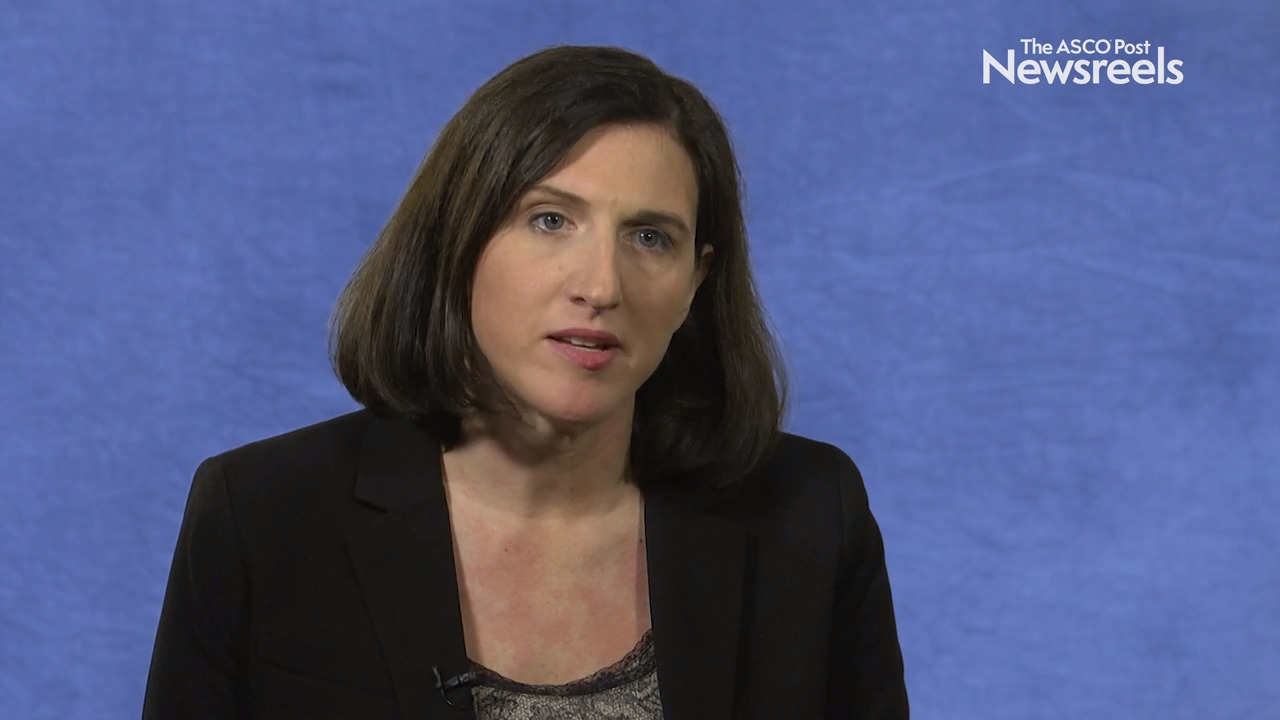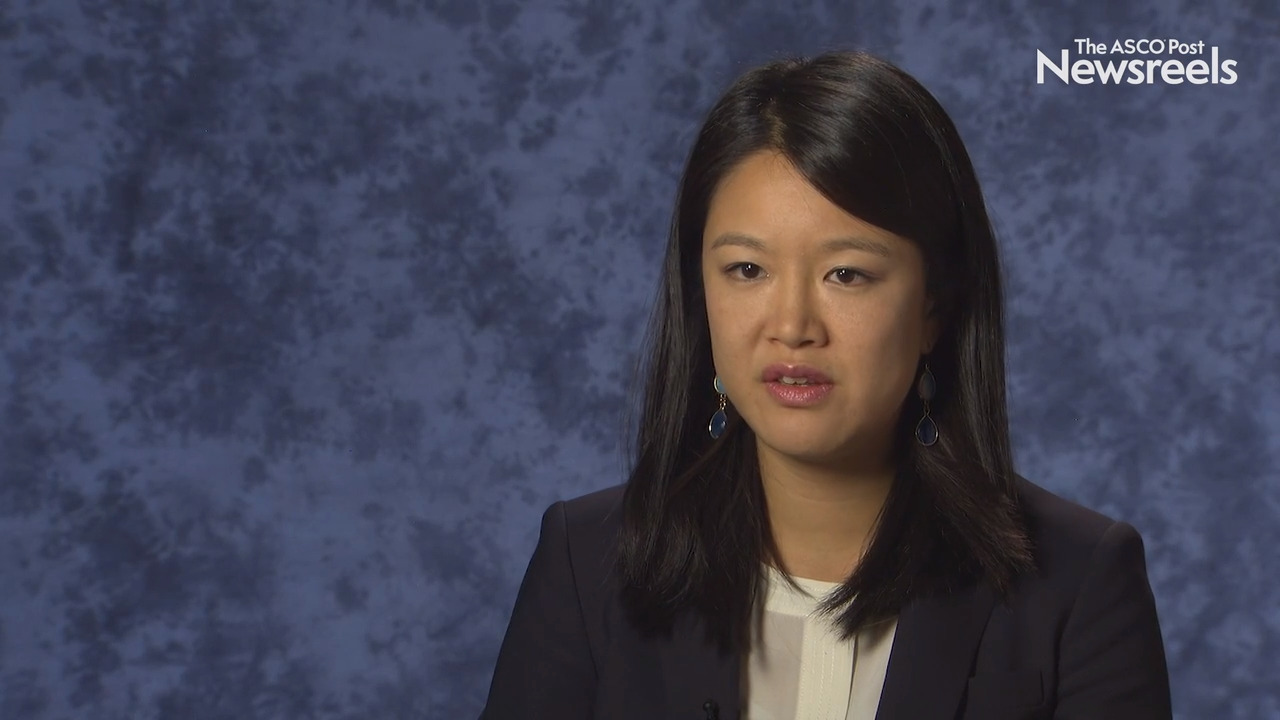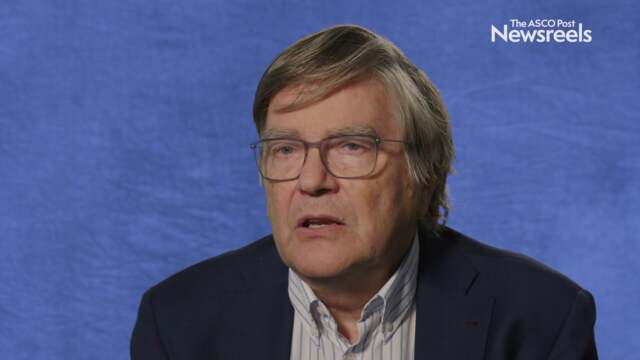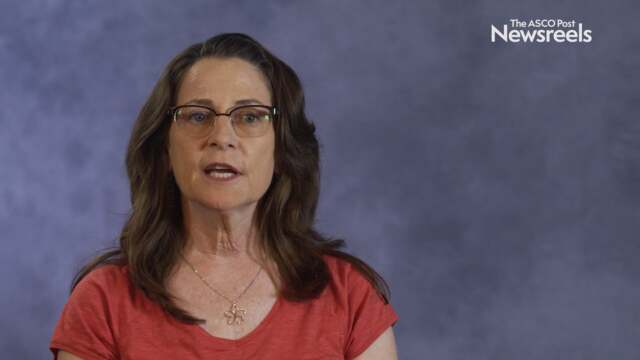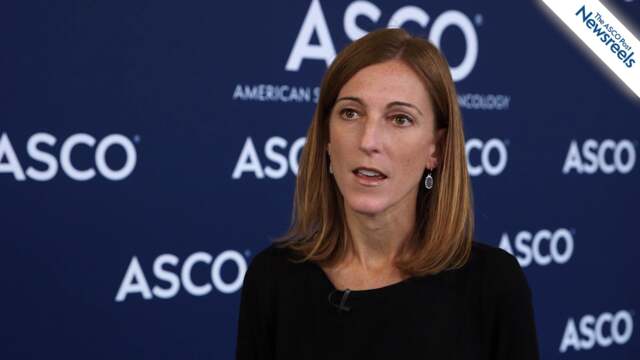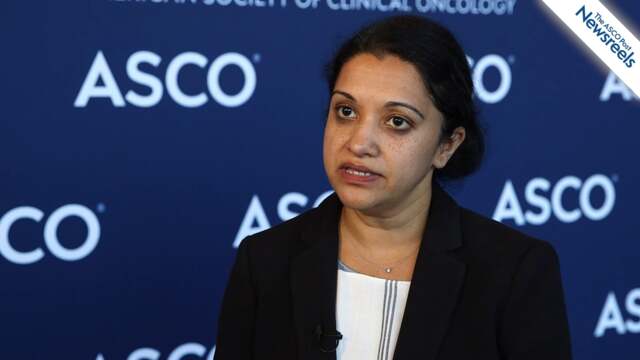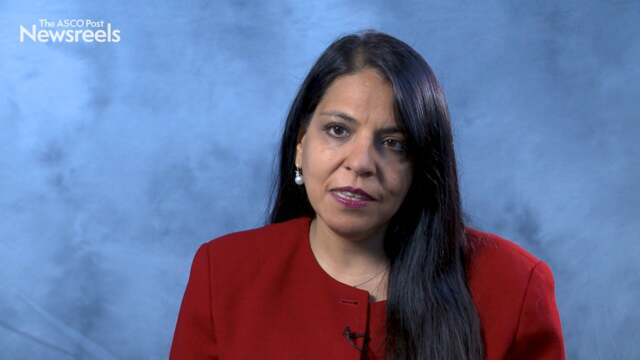Expert Point of View: Alice Mims, MD
Alice Mims, MD, Associate Professor of Hematology at The Ohio State University Comprehensive Cancer Center–The James, shared her insights on the VIALE-A study. “The results of the VIALE-A study have been highly anticipated and are exciting, given the improvement seen in both overall survival and...
VIALE-A Trial Supports Survival Benefit of Venetoclax Plus Azacitidine in Elderly Patients With AML
In the phase III VIALE-A trial, venetoclax added to azacitidine led to a significant and clinically meaningful improvement in response rates and overall survival, as compared with azacitidine alone, in treatment-naive predominantly elderly patients with acute myeloid leukemia (AML) ineligible for...
The Importance of Measuring Health-Related Quality of Life in Older Adults
Compared with younger patients, older patients with cancer face unique challenges because many of them have age-related decreases in health-related quality of life. This can be a result of many factors, such as comorbidities, mental health, physical impairment, and financial stressors. A diagnosis...
Geriatric Assessment: What Are You Waiting For?
The ASCO20 Virtual Scientific Program was the forum for an unusual but profoundly important event in oncology. Four studies that should be practice-changing were presented.1-4 These studies provided irrefutable evidence that we can improve the quality of life of older patients by reducing toxicity. ...
Geriatric Assessment–Driven Intervention Benefits Older Adults With Cancer
Geriatric assessment–driven interventions—such as physical therapy, nutritional recommendations, and social support, among others—can reduce toxicity due to chemotherapy in adults with cancer aged 65 years and older, according to results from a randomized clinical trial presented as part of ASCO20...
Expert Point of View: William Dale, MD, PhD
"We have known for a long time, based on good evidence, that geriatric assessment is good at accurately identifying patients at high risk for chemotherapy-induced toxicity, surgical complications, and increased hospitalizations. This study adds an intervention component based on the geriatric...
Geriatrician Assessment and Integrated Care May Help Older Patients as Well as the Health-Care System
A full geriatric assessment and geriatrician-led multidisciplinary care improved the quality of life of patients aged 70 and older undergoing chemotherapy, targeted therapy, or immunotherapy, according to results of a prospective, randomized, controlled, open-label trial, reported in a press...
Polypharmacy and Inpatient Hospitalization Rates in Older Patients With Cancer
In a study published by Grace Lu-Yao, PhD, and colleagues in the Journal of Geriatric Oncology, researchers found hospitalization rates can increase by as much as 114% in patients with breast, prostate, and lung cancers when those patients have taken 15 or more medications prior to chemotherapy...
Cancer in the Aging Population: ‘Leaving No One Behind’
With the motto of “leaving no one behind,” 420 delegates from 40 countries and 61 faculty members from 19 countries attended the Annual Meeting of the International Society of Geriatric Oncology (SIOG) in Geneva on November 14–16, 2019. SIOG serves as a platform to discuss a myriad of aspects...
Poster to Bedside: Geriatric Oncology Research Updates From 2019 ASCO Annual Meeting
Functional status impairment, limited mobility, comorbidities, polypharmacy, and other aging-related manifestations are common in older individuals. These conditions complicate the oncologic management of older adults, who are underrepresented in clinical trials, even though they form the majority ...
Expert Point of View: Michael Jain, MD, PhD
Michael Jain, MD, PhD, Assistant Member in the Department of Blood and Marrow Transplant and Cellular Immunotherapy at Moffitt Cancer Center, Tampa, Florida, commented on Dr. Kilgore’s findings. Dr. Jain was coauthor of a study by the U.S. Lymphoma CAR T Consortium that presented real-world data...
Real-World Data for CAR T-Cell Therapy Show Benefit in Older Patients With Lymphoma, Lower Subsequent Health-Care Costs
Once considered highly experimental, chimeric antigen receptor (CAR) T-cell therapy is now an established third-line treatment option for B-cell lymphomas and leukemias. CAR T-cell therapy has saved the lives of people who would otherwise have run out of treatment options. But the question is...
How Real-World Data Can Help Contextualize New Treatments in Older Patients
Consider a patient who is referred for neoadjuvant therapy for stage IIIA, HER2-positive breast cancer. She is otherwise healthy, with no significant medical history, an Eastern Cooperative Oncology Group performance status of 0, unremarkable baseline labs, and a left-ventricular ejection fraction...
Oral CC-486 Maintenance Therapy Extends Survival in Older Patients With AML
Use of CC-486—an investigational oral form of azacitidine—as maintenance therapy significantly improved overall survival and relapse-free survival in older patients with newly diagnosed acute myeloid leukemia (AML) who were in remission following induction chemotherapy with or without consolidation ...
ASH 2019: CAR T-Cell Therapy Shows Activity, Reduces Health-Care Utilization in Older Patients With DLBCL
A new analysis of Medicare claims data presented by Kilgore et al at the 2019 American Society of Hematology (ASH) Annual Meeting & Exposition (Abstract 793) has provided the first real-world evidence using claims data available after the approval of autologous anti-CD19 chimeric antigen...
ASH 2019: Is Autologous Hematopoietic Stem Cell Transplant Safe and Effective for Patients Aged 70 or Older With Multiple Myeloma?
Even though autologous hematopoietic stem cell transplantation (AHCT) is an effective treatment for multiple myeloma, only 4 out of 10 patients receive this therapy. A new study presented by Munshi et al at the 2019 American Society of Hematology (ASH) Annual Meeting & Exposition (Abstract 782) ...
Use of an On-Site Touchscreen-Based Geriatric Assessment for Older Patients With Multiple Myeloma
In a study reported in the Journal of Oncology Practice, Nathwani et al found that the use of a tablet-based modified geriatric assessment during physician visits by older patients with multiple myeloma was feasible and provided physicians with information that influenced treatment decisions. Study ...
Geriatric Assessment–Guided Multidisciplinary Care May Benefit Older Patients Undergoing Stem Cell Transplantation
Older adults with blood cancers may benefit from a team-based, holistic evaluation before undergoing transplantation, according to a study published by Derman et al in Blood Advances. The study, which reported on a multidisciplinary clinic at the University of Chicago Medical Center, found that...
Improving Communication With Older Patients Using Geriatric Assessment During Oncology Visits
In the COACH study, reported in JAMA Oncology, Supriya G. Mohile, MD, MS, and colleagues found that including geriatric assessment in oncology visits for older adults with advanced cancer improved patient and caregiver satisfaction with communication regarding aging-related concerns. Study Details...
Short-Term Survival in Patients Aged 85 Years and Older After Colorectal Cancer Surgery
Results from a preliminary research study showed the majority of patients aged 85 years and older were still alive in the short-term after undergoing segmental colectomy for stage II and III colon cancer. Kaur et al presented these findings at the American College of Surgeons Clinical Congress...
Pooled Analysis of Outcomes in Older Women With Metastatic Breast Cancer Receiving CDK4/6 Inhibitor Plus Aromatase Inhibitor Therapy
In a U.S. Food and Drug Administration (FDA) pooled analysis reported in the Journal of Clinical Oncology, Howie et al found that progression-free survival and benefit were similar for older vs younger postmenopausal women treated with combined cyclin-dependent kinase 4/6 (CDK4/6) plus aromatase...
Older Sexual and Gender Minorities With Cancer: A Population Hidden in the Open
The term “sexual and gender minorities” encompasses people whose sexual orientation, gender identity and expression, or reproductive development varies from traditional, societal, cultural, or physiologic norms1 and includes lesbian, gay, bisexual, transgender, and queer (LGBTQ) people. More than 3 ...
ESMO 2019: Personalized Treatment for Head and Neck Cancer Based on Geriatric Assessment
Fit elderly patients aged 70 years and older with head and neck squamous cell carcinoma were able to undergo rigorous treatment that provided benefit similar to that observed in younger patients. However, elderly patients with head and neck squamous cell carcinoma classified by geriatric assessment ...
HIV-Positive Older Adults With Cancer and Worsened Disease Outcomes
In a study reported in JAMA Oncology, Anna E. Coghill, PhD, MPH, and colleagues found that outcomes are often worse among human immunodeficiency virus (HIV)-positive patients aged 65 years or older with cancer vs HIV-negative patients with cancer, after adjustment for first courses of treatment....
Polypharmacy Associated With Functional Decline in Older Patients With Advanced Cancer
Polypharmacy (ie, the concurrent use of eight or more medications) and potentially inappropriate medications may be associated with functional impairment in older adults with advanced cancer, according to research presented by Mostafa Mohamed, MBBCh, at the Multinational Association of Supportive...
All Oncologists Are Geriatric Oncologists...They Just Don’t Know It Yet
You don’t have to be a geriatrician to properly evaluate and manage older patients with cancer. The wave of older patients with cancer predicted over 30 years ago is now fully upon us. The oncology community finds itself ill-prepared to manage the increased number of older patients. It is not just...
Changing Perceptions on Surgical Intervention for Geriatric Patients With Cancer: Role of the SIOG Surgical Task Force
Surgery is an integral part of treatment of elderly patients with solid malignancies. The times we are living in will be remembered by health-care providers for the significant “contradictions” in the medical and surgical care of elderly patients with cancer. On the one hand, it has been...
Overscreening for Prostate Cancer in Older Men Remains an Issue
Although most major cancer organizations agree on the guidelines for prostate cancer screening, there is still uneven application of the test, such as in the older patient population, resulting in overdiagnosis and waste in an already fiscally challenged health-care system. Researchers from the...
Expert Point of View: Susan M. O’Brien, MD
THE STUDY’S discussant, Susan M. O’Brien, MD, Associate Director for Clinical Science, Chao Family Comprehensive Cancer Center, University of California Irvine Health, said the results of the Alliance North American Intergroup Study A041202—demonstrating that ibrutinib (Imbruvica) is more...
Ibrutinib vs Standard of Care in Front-Line Treatment of Older Patients With Chronic Lymphocytic Leukemia
IBRUTINIB (IMBRUVICA) as a front-line agent proved superior to standard-of-care chemoimmunotherapy for chronic lymphocytic leukemia (CLL) in older patients in A041202, an Alliance-led National Clinical Trials Network study.1 At a follow-up of 38 months, the median progression-free survival was not ...
Allison Magnuson, DO, on Older Patients With Breast Cancer: A New Tool to Help Guide Treatment Decisions
Allison Magnuson, DO, of the University of Rochester Strong Memorial Hospital, discusses the development of a chemotherapy toxicity risk score that is associated with dose reduction as well as reduced respiratory distress and fewer hospitalizations (Abstract GS6-04).
Leader in Geriatric Oncology, Arti Hurria, MD, FASCO, Dies at Age 48
ARTI HURRIA, MD, FASCO, died tragically on November 7, 2018, from injuries sustained in a traffic accident. Dr. Hurria was a national leader in geriatric oncology, embracing the age-associated nuances of the elderly, and leading initiatives and research that advanced this specialty field. “The...
Katherine C. Lee, MD, on Emergency Surgery and End-of-Life Care
Katherine C. Lee, MD, of Massachusetts General Hospital, discusses her study findings that showed older patients with metastatic cancer who survived emergency general surgery experienced higher intensity end-of-life care than similar patients who did not undergo surgery (Abstract 56).
Matti S. Aapro, MD, on Immunotherapy in Older Patients
Matti S. Aapro, MD, of the Genolier Cancer Centre, discusses the optimal treatment and supportive care for older patients with cancer, including the importance of maintaining dose density and intensity as well as monitoring toxicity.
Educating Nurse Practitioners on the Care of Older Patients With Cancer in a Comprehensive Cancer Center
To expose future practitioners to the special challenges of treating cancer in older patients, the Geriatrics Service at Memorial Sloan Kettering Cancer Center (MSK) has developed a clinical education model for nurse practitioner students. Why Geriatric Oncology? GIVEN THE aging population, my...
Challenges of Managing Older Patients With Diffuse Large B-Cell Lymphoma
As the population continues to age, the interplay between aging and cancer increasingly shows cancer to be a disease of older people. By the year 2030, there will be an increased incidence of non-Hodgkin lymphoma (NHL) in older individuals.1 The median age of patients diagnosed with diffuse large...
Peggy Burhenn, MS, RN-BC, AOCNS, on Lymphoma: Managing Older Adults
Peggy Burhenn, MS, RN-BC, AOCNS, of the City of Hope National Medical Center, discusses the challenges of working with older lymphoma patients and the importance of effective geriatric assessments.
Expert Point of View: Joshua A. Jones, MD, MA
“AS A SOCIETY, we often think about the value of cancer treatments in terms of survival, but for older patients, we need to look beyond that. Geriatric assessments are clearly an effective tool to help us treat the whole patient. It’s a conversation starter that informs and empowers both patients...
Geriatric Assessment Improves Communication Between Oncologists and Older Patients
A FEDERALLY FUNDED randomized study demonstrated that use of geriatric assessment in the routine care of older adults with advanced cancer significantly improved doctor-patient communication about age-related concerns as well as patient satisfaction with the communication. The study was presented...
Chemoradiation in Elderly Patients With Stage III NSCLC Improves Overall Survival
Elderly patients with stage III non–small cell lung cancer (NSCLC) showed improved overall survival when treated with chemoradiation compared with definitive radiation alone, according to findings published by Eric D. Miller, MD, PhD, of The Ohio State University, Columbus, and colleagues in the...
Does Warfarin Have Anticancer Potential in Persons Older Than Age 50?
A Norwegian population–based cohort study indicated that the use of warfarin was associated with a reduced risk of cancer overall and site-specific cancers among patients aged > 50 years. The findings were reported in JAMA Internal Medicine by Haaland et al. As noted by the investigators,...
Courtney Denton Dinardo, MD, on AML: Treatment Study Results
Courtney Denton Dinardo, MD, of The University of Texas MD Anderson Cancer Center, discusses findings on the durable response with venetoclax in combination with decitabine or azacitidine in elderly patients with acute myeloid leukemia (Abstract 7010).
Supriya G. Mohile, MD, on Communicating With Older Cancer Patients: Results From a Community Trial
Supriya G. Mohile, MD, of the University of Rochester Medical Center, discusses study findings on ways to improve communication with older cancer patients using geriatric assessment (Abstract LBA10003).
A Love of Older Patients With Cancer Drives a Career Path for Arti Hurria, MD, FASCO
Arti Hurria, MD, FASCO, who is Director of City of Hope’s Center for Cancer and Aging, is a first generation of immigrant parents from India. “My parents left India and moved from England to Canarsie, Brooklyn, where I was born. When I was 8, my family moved to Southern California, partly due to...
Arti Hurria, MD, on Survivorship Care for the Aging Population
Arti Hurria, MD, of the City of Hope, discusses ways to incorporate the principles of geriatrics into oncology care and offer targeted interventions for older survivors.
Broadening the Evidence Base for Older Patients: FDA-ASCO Workshop Explores Emerging Strategies
In the not-so-distant past, clinical trials were considered an option only for the young and fit. Enrolling older people “used to be thought unethical,” said Janet Woodcock, MD, Director of the U.S. Food and Drug Administration (FDA)’s Center for Drug Evaluation and Research (CDER), as she opened...
Clinical Trials Actively Recruiting Geriatric Oncology Patients
THE INFORMATION contained in this Clinical Trials Resource Guide includes actively recruiting clinical studies focused on geriatric oncology. These studies highlight psychological interventions, managing cancer symptoms, the surgical process, fall prevention, and making treatment decisions; as well ...
Register for the Geriatric Oncology Workshop
On November 6, 2017, ASCO and the U.S. Food and Drug Administration (FDA) will hold a joint Geriatric Oncology Workshop aimed at improving the evidence base for treating the geriatric oncology population. While more than 60% of cancers in the United States occur in people aged 65 and older, the...
‘Slow, Incremental Changes’ Are Increasing Participation of Older Adults in Clinical Trials
Older adults continue to be proportionally underrepresented in oncology clinical trials, but the participation rate of adults aged 65 and older is increasing by “slow, incremental changes,” Stuart M. Lichtman, MD, FACP, FASCO, noted in an interview with The ASCO Post. Prompting those changes are...
Challenges in Geriatric Oncology in Low- and Middle-Income Countries: Focus on Latin America
Virtually every region and country in the world are experiencing population aging. Although developed regions still have the largest proportion of older persons, the absolute number of older adults is higher in developing regions of the world. Globally, more than 60% of all persons aged 65 now...
